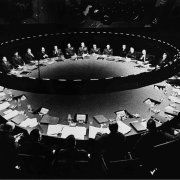Spare the politics………puh-lease.
Phew, well I’m glad that’s over.
9-weeks of excruciatingly numbing political meandering that delivered………… well, not much.
One of the aspects of the campaign that we have been discussing internally has been if we learnt anything. The answer is a general ‘Yes,’ however the content you could treat on a take it or leave it basis.
Polls
Dare I say it, they were one of the highlights of the Aussie campaign.
Despite the general twitterings of the media, the polls were pretty much on a consistent ‘knife-edge’ across the campaign; the end result? A cliff-hanger.
Based on the musings of our esteemed daily papers one could have been excused for thinking that our pollsters were as reliable as their British counterparts (or the BoM forecasting Melbourne weather) with their ‘forget the numbers, Turnbull’s got it’ commentary.
Messages
It helps to have them.
Attempting to bore your target audience in to submission clearly doesn’t work.
Hopefully the last couple of months’ acts as the lethal injection that obsolete sloganeering without substance needs.
It could have been worse I guess: Cheap Cheap anyone?
The Greens
Surprising? Not really.
Well performed? Not really.
Going places? Most likely.
I would have thought that in the absence of discussion void of any real substance regarding a pragmatic (forget about visionary) forward-looking agenda for the nation, that there was a huge opportunity for The Greens to appeal to the abiding Australian sense of egalitarianism.
This ‘third force’ in Australian politics also appears to have been sucked in to a narrow (and narrowcast) script, despite the ample areas of opportunity (climate change, asylum seekers, homelessness, re-balancing Commonwealth infrastructure spending to include more public transport, the cost of living etc etc) for the further ‘Left’ of pour political landscape to carve out more ground.
The Greens campaign I would describe as overlooking the bigger picture; bicycle super highways have cool renders tho.
Our preferential voting system
Is it time to give it the boot?
As it stands all seats in the House of Reps come down to a two-horse race. Why is it that the jockey of every beaten horse then gets a say in the eventual winner, even though their mount dropped out before the home straight?
The ‘One Vote, One Value’ principle seems to be undermined when a vote for one set of values (or whatever substitutes for them these days) ends up in a camp with a different set of principles.
Preferences don’t even seem to make much difference. As a case in point, the ALP received its second lowest primary vote in history and was a kick of the footy from winning this election.
Which leads me to the……
AEC
I read earlier this week that India can count 800 million votes in a day.
Brexit was confirmed in 7-hours.
In Australia our measly 10 million votes are only approximately 70%. Sure we have the complexity of preferences and the use of the postal system etc, but surely we can speed things up a bit.
A move to first past the post voting, or maybe even using that futuristic thing called the internet could help?
Scare Campaigns
Work.
If, the target of said campaign permits them to.
With a week or more to go before the poll, a robust disaggregation of what was being considered for Medicare (and why), contrasted against the scaremongering may have enabled our soon to be re-sworn in PM to make a statesmanlike speech on election night.
Split the ‘Right’
Given the ‘conservative discontent’ within the broad church of the Liberal Party, will it be an ALP strategy over the course of this, and subsequent terms of government, to try and foment this unhappiness with the view to seeing ‘Team Cory Bernardi’ become to the Libs what The Greens are to them?
Perhaps, but unless we did away with preferential voting such an achievement wouldn’t make any tangible difference (based on where I presume preferences would flow).
What did we learn?
If you want to bring people with you, one needs to understand who they are, what’s relevant to them, and speak to them in their language. Ideally, this process won’t take any longer than necessary.
If you have an opportunity, take it. Never expect that it will exist forever.
Keep things simple, clear and efficient. No one has time, nor are interested in reasons/excuses why the apparently simple is actually not simple. In short, understand and meet expectations.
If, and when something incorrect is said; correct the record. Keep correcting the record until the record is correct. If you don’t do the work you don’t have anyone to blame but yourself.
Strategy. A lot of strategies look great on paper and over sound great over a cup of coffee, but said strategy is going to deliver the same result as would have been the case prior to developing, investing in, and implementing it why bother? Better to spend the time identifying what you want to achieve and develop a plan that will actually deliver difference rather than same same.
So………
As things stand today, let’s hope that Sir Peter Cosgrove extends his French sojourn a little longer to allow the dust to settle, and for us innocent Australians to focus on the important stuff in life like football, kids going back to school, and paying bills. You know, the things that need to be considered by every Australian, every day (and yes, that includes football).




